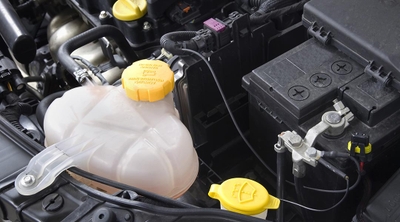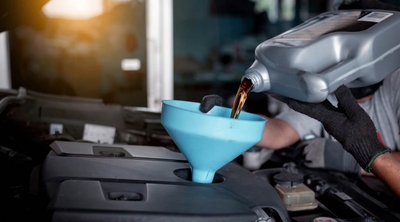What to do if your car overheats
3 min read
An overheating engine is a sign of a problem with your vehicle’s coolant system. If your car overheats quickly, you should see a mechanic. If your car is running hot but not overheating, it’s a warning sign that there’s a problem, and you should have it inspected.
Why does my car overheat?
Cars are complicated machines with a lot of moving parts. A combustion engine uses contained explosions to propel the vehicle forward. Burning fuel generates a lot of heat. Combining that heat with high external temperatures can cause a vehicle to overheat quickly. Your car’s cooling system will keep the engine temperature within safe limits in normal situations.
Reasons why your car is overheating
Engine needs coolant fluid
According to Jonathan Ganther, COO and founder of Brakes To Go, there are a variety of potential causes of an overheating car. “Often, your car’s coolant is the root of the issue,” he says. “Coolant is used to regulate the temperature of your engine. If your coolant is old and needs a replacement, it can cause clogs and jam passageways in your engine that restrict coolant flow. To prevent this, your coolant should be regularly flushed to manufacturer specifications.”
According to KBB, flushing the coolant and replacing it every two years or 30,000 miles helps to avoid your vehicle overheating. Keep an eye on your car’s fluid levels and check your coolant levels regularly.
Your grill is clogged and dirty
Another potential source of overheating comes from the vehicle’s grill. “Debris in your car’s grill can also be a major cause of overheating,” says Ganther. “While people often assume grills are cosmetic, they are actually vital for airflow throughout the vehicle. If pieces of debris are stuck in the grill, your vehicle will struggle to regulate its temperature, making overheating more likely.” You should wash your car regularly and remove any impacted bits of leaves or gunk in the vehicle’s grill.
Cooling fan is not working
If you find no other reason why your vehicle is overheating, look to the cooling fan. “Cooling fans work to keep your engine cool by pulling cold air from your radiator fans,” says Ganther. “If your cooling fan motor is burnt out or fails, it’s possible that your vehicle may overheat.”
Look for signs that your cooling fan needs maintenance. Those signs include warm air coming from your air conditioner, whirring sounds from the engine, and warning lights on your dashboard.
What happens if my car is overheating while driving?
If your car is overheating while driving, you should not, under any circumstances, continue. It can cause extreme damage to the engine and even lead to a fire. Pull over if your temperature gauge starts to tick up too high. According to Ganther, “As soon as you see your temperature gauge rise, you should pull over and let your car cool down. Exit the vehicle immediately and look for any steam rising from the engine or coolant or fluid leaking out of the car. If you observe either of these things, get your car towed to the nearest auto shop. Continuing to drive an overheating vehicle can result in a head gasket failure, which can cost between $1,500 and $3,000.”
Before checking the engine, wait for the vehicle to cool off. Patrick McCann of WeTryTires.com recommends waiting at least 10 to 15 minutes with the hood open. “Once [the engine] has cooled down, check the oil level, and check the coolant level in the engine,” he says. “These can be located in the vehicle manual.” If your car overheats, you should always have it inspected. The problem might be something minor, like a blown fuse. In most cases, a lack of coolant may be the culprit. However, more serious problems might need professional repair. Ignoring it can lead to expensive repairs that you can prevent with early enough intervention.




